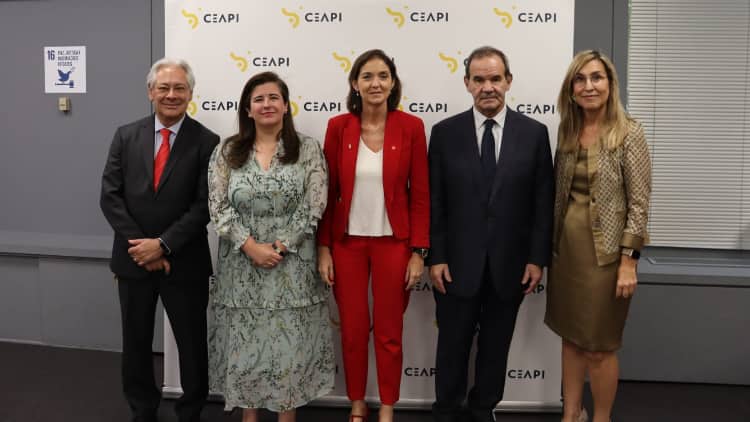The Diplomat
Ibero-America is poised to bounce back strongly after the Covid-19 pandemic, according to a report prepared by the Consejo Empresarial Alianza por Iberoamérica (CEAPI) and presented yesterday at the Ibero-American General Secretariat.
The report, entitled “Why Ibero-America” indicates that, despite representing only 9 percent of the world’s population, the region has contributed 32 percent of the total number of deaths from COVOD-19, partly because of the crisis in social services in the region.
Even so, and despite the existence of an adverse situation, Germán Ríos, Director of Studies and Research at CEAPI and author of the study, considers that there are reasons to remain optimistic and to predict that Ibero-America “can become one of the regions of the world with the greatest post-COVID potential”, among other reasons because the countries that form part of it are rich in natural and food resources.
For example, the report underlines that, among other minerals, Latin America possesses 85% of the world’s lithium, and the increase in the production of electric cars will demand greater quantities of this mineral. It also indicates that the region possesses “40% of the planet’s diversity and 33% of the world’s fresh water”.
The study refers to a possible change of cycle in raw materials such as “the 2004-2014 period that particularly benefited the American countries of Ibero-America” and shares that “another relevant factor is that the pandemic has accelerated the purchase of goods online”.
In addition, the study highlights the upturn in e-commerce during the pandemic, which is here to stay, as another focus of potential growth for the region. The global e-commerce industry, which reached unprecedented peaks during the months of confinement, needs strong and urgent infrastructure development and will require investments that will entail “increased demand for commodities such as iron, steel, cobalt, platinum, silver, copper and other metals”. These resources are abundant in the area, “which could make Latin America one of the main suppliers”.
Similarly, the technology industry is positioned as another of the potential spearheads of regional economic growth. While Spain and Portugal stand out in terms of digitisation and automation, Latin American countries are today some of the most dynamic in the world in terms of investment in digital start-ups”.
Other areas “such as food production and the possibility of receiving investments in the manufacturing industry, as a result of the diversification of suppliers in global production chains, become additional opportunities”, he adds.
Despite the amount of resources and opportunities opening up for Latin America, the report recalls the high rates of inequality that the region has historically faced.
It also invites the private sector to increase its investment in the region and stresses that “the private sectors of the countries of Ibero-America are dynamic, socially responsible and work together to take advantage of opportunities on both sides of the Atlantic”.
The presentation ceremony was attended by the Ibero-American Secretary General, the Chilean Andrés Allamand; the Spanish Minister of Industry, Trade and Tourism, Reyes Maroto; the General Business Director of BID Invest, Gema Sacristán; and the President of the Business Council Alliance for Ibero-America (CEAPI), Núria Vilanova.
Allamand emphasised the “balanced and positive narrative” that the study provides about the region, because “many times when it comes to Latin America, the focus is on the problems”.
To resolve the pending challenges, he called for more “alliances” between the public and private spheres, and assured that the public sector can “drive growth”, “improve governance” and underpin “confidence” to work in this direction.
Minister Reyes Maroto agreed with Allamand on the need to generate global solutions to solve “problems that are already global”, and valued Spain’s trade relations with Latin America, “an exceptional client” that imports Spanish goods worth “15 billion euros” and where the balance between exports and imports is increasingly “balanced”.
For her part, Núria Vilanova, President of CEAPI, underlined Spain’s role as a “bridge for investment”. In this sense, she indicated that “there are still growing investment opportunities in America and Spain has an advantageous position in them, as they are going to be very necessary in the fields of solar and wind energy – where the country has a great deal of experience -, infrastructures and the creation of production centres. In this line, nearshoring is already a reality and it is necessary to create centres to supply the large markets represented by the United States and Europe”.






